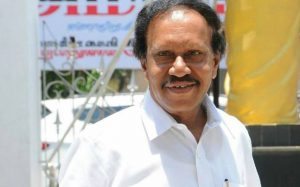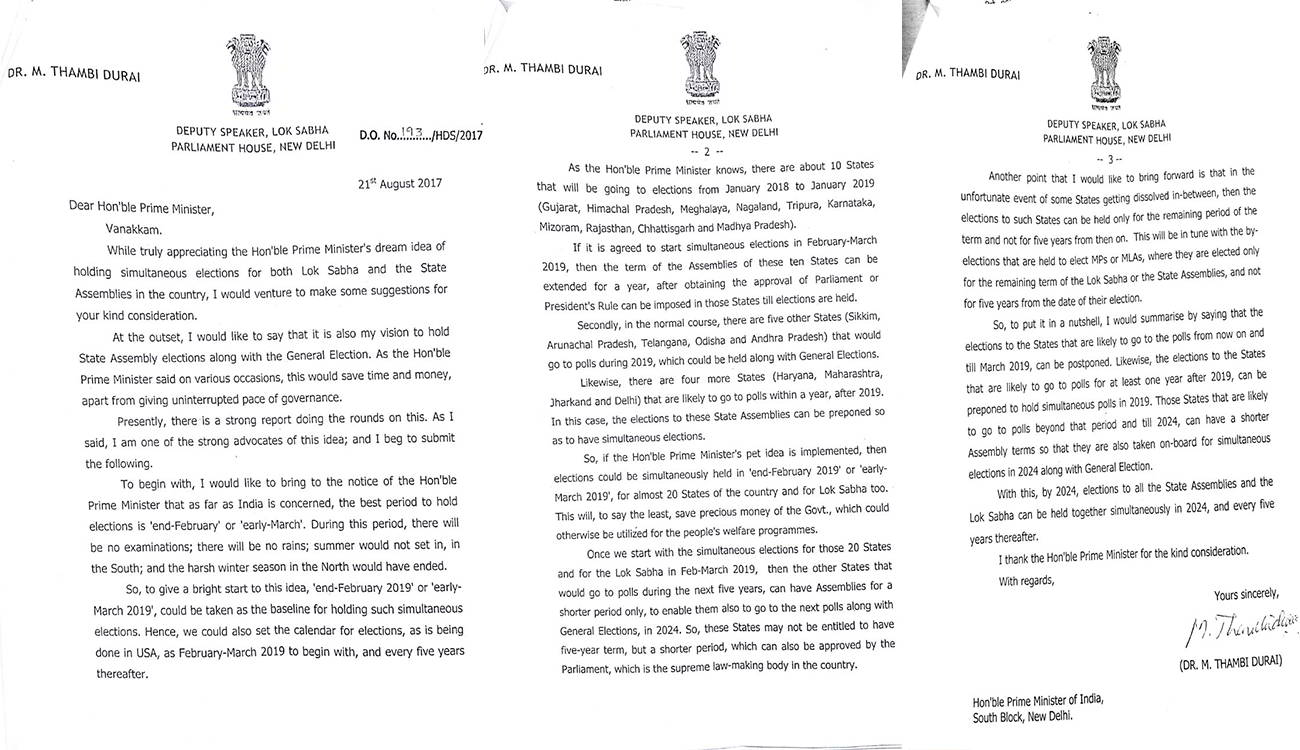Above: The Election Commission of India. Photo: Anil Shakya
~By Puneet Nicholas Yadav
Lok Sabha deputy Speaker M Thambidurai had written to chief ministers, seeking their views on holding federal and provincial polls together. The Election Commission of India (ECI) has said that on its part, it’ll be ready by September 2018.
Could Prime Minister Narendra Modi and his BJP soon set the wheels in motion for amendments to the Constitution and other legislations that govern the conduct of federal and provincial elections to ensure that simultaneous polls to the Lok Sabha and state assemblies become a reality by February-March 2019?
The letter by senior AIADMK leader M Thambidurai to the Prime Minister in August and to chief ministers not only endorsed the proposal but also proposed that simultaneous elections to the Lok Sabha and state assemblies be held by “end-February or early-March 2019”.
On Wednesday, while attending a function in Bhopal to launch the ERONet software (to check inaccuracy and duplicity in electoral rolls), Election Commissioner OP Rawat had told mediapersons that the government had sought a response from the EC on conduct of simultaneous state and national polls.
Rawat said that the EC would require around 40 lakh electronic voting machines (EVM) equipped with voter-verifiable paper audit trail (VVPAT) apparatus for holding the simultaneous polls and confirmed that orders for these had been placed by two government agencies. The Election Commissioner said that the poll panel had been allocated Rs 3,400 crore for procuring the additional EVMS and Rs 12,000 crore for the VVPAT equipment and added that “We will be logistically ready to hold simultaneous polls by September 2018.”
Rawat, however, qualified his comments by insisting that “it is up to the government to take a decision and make necessary legal amendments” for conducting the polls simultaneously.
The Election Commissioner’s comments, when read in reference to the remarks made by Thambidurai in his letter to PM Modi (dated August 21) and to chief ministers (dated September 13)—copies of which are in possession of APN—show that there is a clear effort to rollout the big electoral reform soon.
In his letter to the Prime Minister, Thambidurai says: “presently, there is a strong report doing the rounds on this (holding of simultaneous polls)… so, to give a bright start to this idea, end-February or early-March 2019 could be taken as the baseline for holding such simultaneous elections.”

Thambidurai also addresses a key argument being made against the proposal by the likes of former chief election commissioner SY Quraishi and other election experts—what would the government or EC do if a state government fails to complete its full term in the event of failing a floor test or some other unforeseen situation? Will all state assemblies and the Lok Sabha then be dissolved to have another round of simultaneous polls?
Thambidurai suggests in his letter to Modi: “in the unfortunate event of some state (assembly) getting dissolved in between, then the elections to such states can be held only for the remaining period of the term and not for five years (the usual term of an assembly or Lok Sabha) from then on. This will be in tune with the by-elections that are held to elect MPs or MLAs where they are elected only for the remaining term of Lok Sabha or the State Assemblies and not for the five years from the date of their election.”
The Lok Sabha deputy Speaker goes on to say: “the elections to the states that are likely to go to polls from now on and till March 2019 can be postponed (till Feb-March 2019). Likewise, the elections to the states that are likely to go to polls for at least one year after 2019, can be brought forward to hold simultaneous polls in 2019. Those states that are likely to go to polls beyond that period and till 2024 can have shorter Assembly terms so that they can also be taken on-board for simultaneous elections in 2024 along with the general elections”.
Thambidurai has proposed that if the government adopts his formula then “elections to all State Assemblies and the Lok Sabha can be held together simultaneously in 2024 and every five years thereafter”.
It remains to be seen whether or not the Centre and the EC adopt the Lok Sabha deputy Speaker’s formula for simultaneous polls. However, it is certain that the radical electoral reform would face stiff resistance from opposition parties, especially the likes of Congress, Trinamool Congress and CPM who are ruling various states and wouldn’t want the terms of their governments cut short to give an obvious electoral advantage to the BJP, which at least for now seems invincible in its victory march at the hustings.
There are also a host of other technical and operational problems that the poll panel will need to address before venturing out to implement the proposal.
As former CEC SY Quraishi said in an article he wrote for India Legal—APN’s sister-concern— recently: “while the idea (of simultaneous polls) is desirable, it is doubtful whether it is feasible.”
Quraishi cited multiple hurdles in implementing the reform: “Let us first consider a practical constraint. Even if elections were to be held simultaneously, every state and every assembly will witness its own political course. What is one to do if a particular state witnesses an upturned majority in case a few of the MLAs decide to shift their “loyalty”? How are simultaneous elections to be continued in such a scenario? Or, as was the case in 1998, what happens if the Lok Sabha is dissolved within 13 days? Do we also dissolve all democratically elected state assemblies for reasons beyond the states’ boundaries?”



